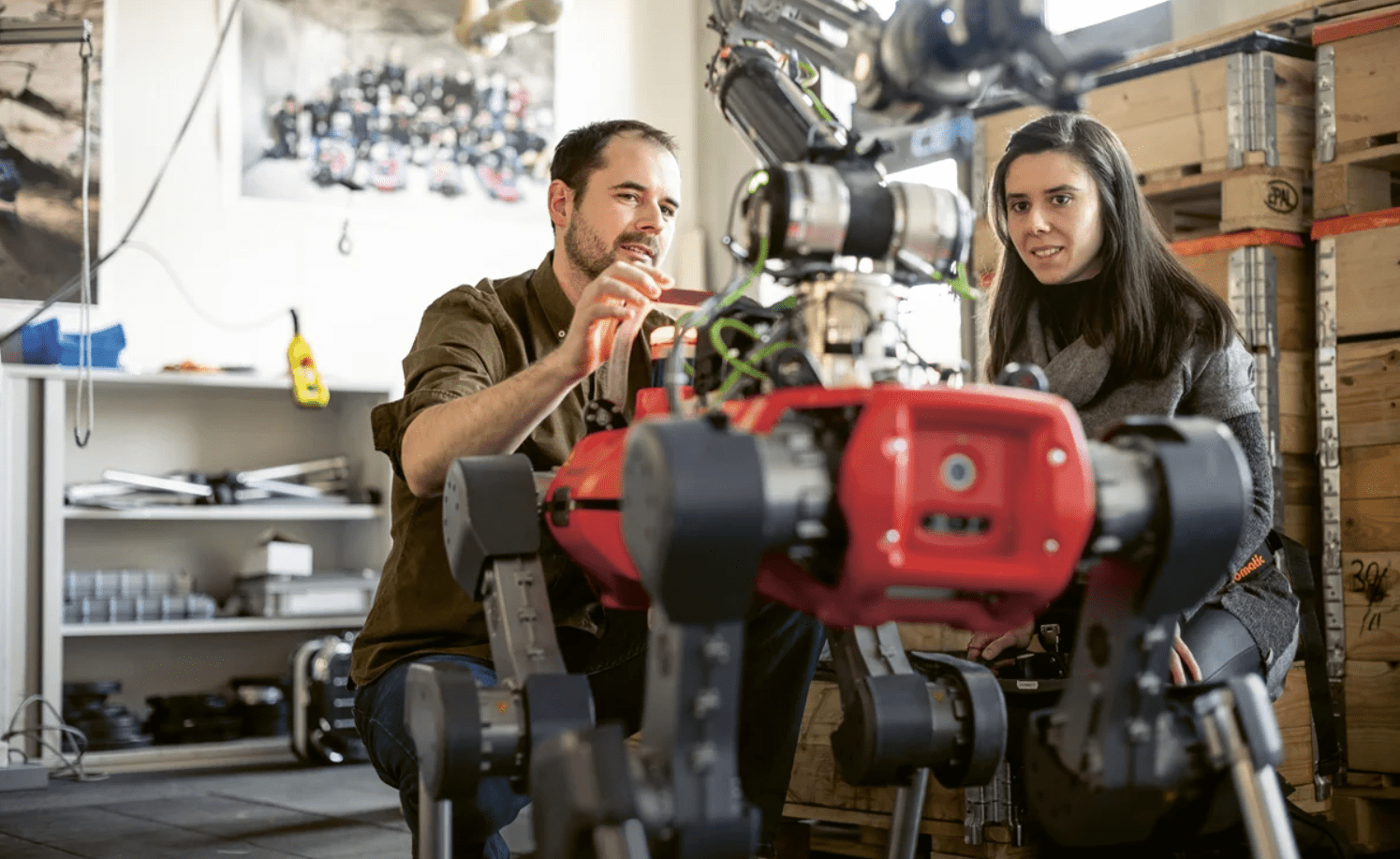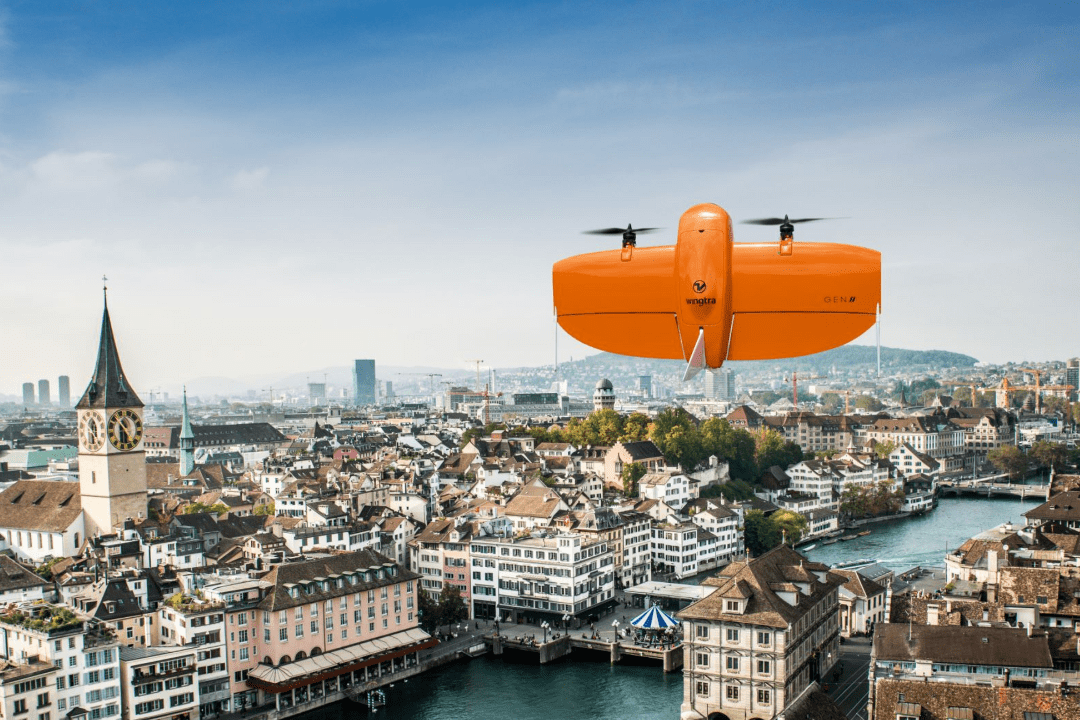Marco Hutter, professor at the Swiss federal institute of technology (ETH) and serial entrepreneur, knows where the greatest opportunities in robotics lie. We pay a visit to his lab.
The Greater Zurich Area, which includes ETH, is often termed the Silicon Valley of robotics. Justifiably so?
Marco Hutter – We have indeed made a good name for ourselves. Besides our research, which counts among the world’s finest, many robotics start-ups are located here, and also large companies – especially in the IT sector – that have entered into the robotics field. Switzerland has always been a leader in mechanical engineering and automation, and robotics is nothing other than a continuation along the journey to autonomation.
ETH has set up the RobotX Center to bolster its position in the field of robotics in the coming years. How exactly?
Firstly, by continuing to expand the scope of its research, specifically across disciplines. Secondly, with the support of industry, as many major industries are increasingly realising that robotics can provide the answer to many of today’s problems – from the shortage of skilled workers to sustainability to the scarcity of resources. ABB Schweiz, Hilti and Credit Suisse are already partners and are jointly funding new professorships and projects. Thirdly, by designing programmes in which students not only learn theory but also work hands-on on systems, we want to promote education and training in the field.

Your Robotics Systems Lab generates a large output of start-ups – such as ANYbotics, that’s put the four-legged walking robot ANYmal on the market. How does the ecosystem work?
The start-ups and their outreach make Zurich even more attractive for top students. In terms of what they mean to our lab, they show that our research doesn’t just end up in a paper but achieves an impact that extends much further, and this is incredibly motivating. There’s also a feedback loop between the two parties. For example: ANYbotics robustified the technology that is in ANYmal, and which was first developed here. When I was doing my doctorate, we built the initial prototypes – but they always quickly broke down. Now, thanks to our start-up, ANYmal is a reliably functioning product. The lab can use these robust and mature systems for research missions in difficult terrain and develop new expertise. A key part of the journey was our ETH Pioneer Fellowship grant. This carried us through the time when the technology was insufficiently developed for investors until the company was founded.
In 2021, your team won the DARPA Subterranean Challenge, the biggest robotics competition in the world. What did that mean to you?
It was a fantastic success! Never before had a group with a European lead won a DARPA competition like this. And we used almost only Swiss robotic systems. The win was also a boost for the walking robots field, especially since they’d long been seen as a gimmick.
At the end of last year, ETH announced that the DDPS (Department of Defence, Civil Protection and Sport) was supporting selected robotics projects that could be used in future by rescue and security forces in unarmed missions.
Robotics has a huge amount to offer when it comes to rescue and clean-up operations, such as after a storm or accident. But organisations like the fire services don’t have the money for ten years of robot research. We’re working with the DDPS to test technology with end users, so that they understand what’s available and we understand what’s needed. Every year we go to a training village for a week and test our systems in fields of debris or in buildings with radioactive material. I’m convinced that in just a few years we’ll be able to build effective robots that can be deployed in situations of genuine danger.
What do you say to criticism about possible warfare applications?
We’re very aware of this problem which, incidentally, has long been a subject for many technologies. This is why we’re transparent and have clear guidelines and regulations, which also apply to the start-ups.
How might robotics one day change our daily lives for the better?
Unfortunately, there are still many jobs that are so dangerous that no person should be doing them: in mines, for example. Robots would be better here. Certain industries, like the construction industry, are having difficulties to find labourers. This is also where robots could step into the breach. Robots represent a huge opportunity for enabling agriculture to produce on a more profitable and sustainable basis. By the way, that doesn’t mean that robots will take away our work: robotics is creating many new jobs and will form part of a societal restructure. And: this week we did tests with a paralysed person who struggles with everyday tasks. By opening doors, or grasping an object, robots offer chances to make such people’s lives significantly easier.
Why are philanthropic funds well invested in robotics?
Because there’s a huge amount of young potential available to drive the field to new levels. One of the largest pools of students at ETH is formed by the Master’s programme in robotics and there are so many possibilities for transferring research into a commercial enterprise. But: robotics needs a lot of time. By contrast, if you develop an app, the business is much simpler and quickly scalable. In robotics, we need a lot of staying power until systems are economically profitable. And also because robotics is an important pillar for Switzerland and its future.
What would you still like to experience in your research career?
I’ve always been fascinated by space research. And now it’s really taking off. I’d like to see our technology used on the Moon or Mars.
This article has been fist published by ETH Foundation on 6th of June 2023 (© ETH Foundation / Isabelle Vloemans). Read the original article here.
The Silicon Valley of robotics
The Silicon Valley of robotics
The Greater Zurich Area continues to be a global leader in robotics, drone technology, and computer vision. There are close ties in the region between the industry, world-class universities and researchers, and innovation-friendly authorities. This has driven revolutionary advancements, attracted leading technology firms and talent, and encouraged entrepreneurship in the region, leading to unmatched opportunities for robot technology and intelligent systems companies.
Multinationals, SMEs, and startups that are in Greater Zurich enjoy a high availability of talent. This is thanks to a plethora of renowned higher education institutions in the region.
More News
Meet with an expansion expert
Our services are free of charge and include:
- Introduction to key contacts in industry, academia, and government
- Advice on regulatory framework, taxes, labor, market, and setting up a company
- Custom-made fact-finding visits, including office and co-working space
